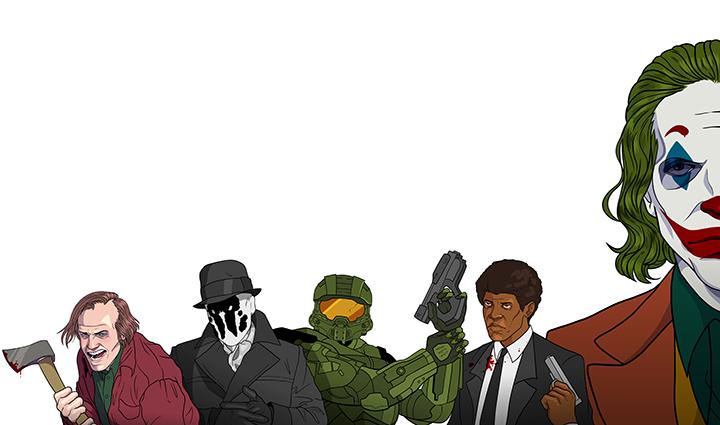Our world today is surrounded by technology. We use it in schools, at work, at home, anywhere we turn, there’s a screen. While our technology is used in ways of work and school, we also use it to entertain ourselves.
In our entertainment, however, we find that there is some controversial concerns with what we put out in theaters. On Friday, Oct. 4, the movie the “Joker” was released nationwide, and some viewers were concerned about the movie’s influence on the audience.
In 2012, the Aurora Theater mass shooting was devastating news, occurring during a viewing of “The Dark Knight Rises.” The shooting was caused by a man, who many wrongly assume was dressed up as Joker.
So much so, Yohana Desta, of Vanity Fair, wrote a piece about people connecting this particular shooting to how the character Joker can influence the shooter. Desta points out there was no intentional attempt made by the shooter to be like the Joker.
Still, the same movie theater, seven years after the shooting, refused and did not offer viewings of the “Joker.” Families of the victims sent a letter to the film’s production company, Warner Brothers, asking to donate portions of the funds to groups who support gun violence victims.
The movie studio responded saying they have been donating to victims of violence for awhile. The statment goes on to say “Make no mistake: neither the fictional character Joker, nor the film, is an endorsement of real-world violence of any kind. It is not the intention of the film, the filmmakers or the studio to hold this character up as a hero.”
It is the Aurora shooting (and others) that has people concerned about the safety of entertainment content for the younger generations. Many argue that entertainment is becoming too violent, that an R rated movie or an M rated video game is enough to spur violence. On the other hand, people do not believe that media creates violence and Hollywood is not at fault, nor the directors creating movies.
“The problem with [entertainment] today is that parents are not abiding by our rating system,” Brycen Witt, sophomore, said. “They think that every movie is made for children, especially movies like the “Joker” which have characters that children probably know, but it specifically says ‘this movie is not for children.’”
Dr. George Boone, a visiting professor of business, was very enthusiastic about the movie industry and the potential behind the movie “Joker.”
“I think an R rating is meant to indicate to people that yeah, this is going to be intense content,” Boone said. “I think that the problem with our rating system in a lot of ways is that it reduces things down to five different possibilities. With that kind of reduction, you’re going to have a lot of things with certain topics that don’t really fit; they could be placed in one or the other.”
The movie “Joker” is rated R, and according to the Motion Picture Association of America’s rating system, these kinds of movies are restricted for those under 17, requiring an adult supervisor to accompany them into the theater.
“I think Warner Brothers is probably, at least in some ways, happy they received an R-rating,” Dr. Nicholas Benson, visiting professor of communication studies, said. “Marvel has seen massive success with properties that align well with the wholesome family values of their parent company, Disney. However, Warner Brothers has yet to figure out how to leverage their DC properties in the current marketplace. They’re making a comic book movie that Disney will likely have a difficult time competing with, assuming they even want to. Warner Brothers is showing they are willing to court controversy, something Disney has usually been wary of.”
However, the rating system is not required for home viewing, where children are more likely to be exposed to it. So why is there a huge uproar about “Joker” and its potential violent impact on society?
“Thinking back to the Aurora mass shooting. That guy dressed as the Joker wasn’t really influenced just by watching a movie with violence in it,” Hannah Sims, sophomore at St. Ambrose, said. “Someone doesn’t just watch a movie, see violence and leave the theater thinking ‘Huh, I’m gonna go kill people now.’ No, that part was already in them. It’s just a movie.”
While it remains a possibility that people are intrigued with the plot of characters, or villains, such as the Joker, Harley Quinn, Thanos, Magneto, etc., it seems unlikely that they are directly influenced by their behavior. If movies, comics, and/or video games want to portray anything, it’s the backstory of how those villains became “evil.”
“I think it’s great that they’re contextualizing and going back into the history of the villains in movies,” Boone said. “It shows that anybody could have become this, anyone who’s been abused or gone through terrible times. These movies show that anyone, in fact, could become the Joker.”
The debate continues on why the movie “Joker” is erupting with controversy.
“The discourse around “Joker” seems to be reflective of a particular set of anxieties we have about violence, particularly the kind associated with frail, white masculinity,” Benson said. “Over the past several years the frequency of mass shootings has increased, and conversations about mental health and gun control have been at the forefront of national conversation. “Joker” did not generate these concerns, but it certainly has been a magnet for conversations about them.”
Benson says when people think society is in despair the first thing often blamed is the media.
“We as a society are actually not as violent as we used to be,” Boone added. “We as a species have been violent throughout history. I mean, just look at ancient Greece and the myths of the gods there, or even stories in the Bible. Zeus wasn’t child friendly, and neither was Cain and Abel. I think that ethically speaking it’s really easier to just say ‘That’s an evil person, no one would do that unless they are bad.’ The American individualist look on certain people is to say ‘that person’s the problem, not the system that produced it.’”
This type of situation is seen in all forms of entertainment, not just movies and television. Video games are a very popular source of entertainment, and many games these days are showing not only violence, but other forms of negative content.
“What people are ignoring is that certain movies and videogames are actually negatively impacting culture with rampant sexism and misogyny, your eight year old should not be playing GTA and killing strippers, they should be playing Pokemon Starting Valley,” Ash Loughlin, senior, said. “There’s a huge genre of video games that are FOR kids, and parents are turning a blind eye to what the games are actually about.”
The idea of being able to study whether or not media can make someone violent is not simple. The violence in literature is being debated as well, with the creation of certain blockades towards any form of violence, among other negative content (ex. Banned Books Week).
Benson agrees that media can influence people, but our “culture” can affect media. According to Benson the whole system is a broken feedback loop where messages can be distorted and change meaning.
“I think it’s important to remember that people read media texts in complex ways,” Benson said. “Some fans of violent action films, myself among them, aren’t much in it for the violence per se, but an appreciation for well-crafted choreography, melodrama, music, and spectacle. One person’s night at the Ballet is another’s John Wick. While one of those is considered high culture, the pleasures their respective enthusiasts get from them are often not that different.”
The fact that our entertainment includes plenty of violence may be due to audience demands or it may be due to the use of entertainment as an outlet.
“Uses and gratifications is when we seek out media for specific purposes, usually related to our emotions,” Boone said. “If I’m really angry I’m going to seek out media, like a violent video game, to express or relate to that anger. To blow off steam, so to say. If I’m sad, I may watch a happy movie to combat it, or watch a sad movie to express that sadness. We are very purposeful when we pick our entertainment.”
“Joker” brought in $96 million domestically and $151 million overseas equalling $247 million total.
Over the last few months numerous media articles asked if the “Joker” movie would incite copycat killers. The FBI even released a warning of potential shootings at “Joker” showings. There were no shootings or acts of violence at any “Joker” showings this past weekend.
Additional reporting by Brady Johnson/Observer Staff and Anh Cao/Observer Staff.
Graphic illustration by Alyssa Duckett/Observer Staff










































































































